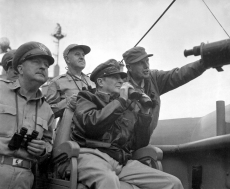
In the New York Times article mentioned briefly earlier, Walter Waggoner notes that apart from the US pressuring the UN into the use of their flag and appointment of General MacArthur, the US army effectively became a UN police force in all but name; further proving US influence over the UN in Korea. This public article was not censored or hidden and the Soviet Union would have been well aware of the US dominance over the UN, which is perhaps largely why they chose to boycott the organisation. The effect of all this was that the USSR tightened its grip on North Korea and therefore the US’ dominance over the UN can most certainly be argued to have alienated the North and removed all possibilities of a united Korea short of civil war. Indeed in NSC (National Security Council) report 8/2 the United Nations repeatedly echo the US claims of the dangers of Communism and even discuss with the US possible nuclear action against the USSR. One of the conclusions drawn in the document is that the US should use all means at its disposable to halt and contain Soviet influences both in Europe and in Asia (which of course refers to Korea). Clearly then the stance of the United Nations in its early years was incredibly slanted towards the USA which undermines not only its credibility as a neutral organisation but also as keepers of world peace. Perhaps the best example of US power over the UN is noted by Stone when he identifies that Truman actually sent troops into Korea before gaining UN permission in 1950, thus breaching Article 2(7) but because the UN relied on US funding and was scared of Soviet expansion it had no choice but to turn a blind eye and approve the civil war. With the UN in US hands there were never, realistically, going to be any real form of negotiations between divided Korea as the US (and therefore UN) would refuse to allow the country to be unified under Communism. This is evident in the US foreign policy document in 1955 two years after the armistice which explains how they (and their allies) prevented North Korea from joining the UN. As Chi Young Pak explains, their refusal to have North Korea on the UN removed all chances of potentially reconciling with the Republic of Korea (South). Of course the majority of these various US government documents cited above were classified and not available until recent decades, largely in the 1990s, so the US were able to maintain the ‘moral high ground’ and depict North Korea and Communism as responsible for the divide.

0 Comment:
Be the first one to comment on this article.